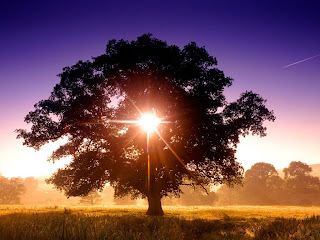One common question: why belong to one particular
religion or follow any specific path? With all the corruptions and abuses that
occur within institutional religion, wouldn’t it be better to divorce oneself
from such systemic sickness and simply cull what is of value from these
lineages, or, better yet, rely on one’s own inner resources and guides? If the
tree has produced some wonderful fruit but has also become diseased, isn’t it a
healthier choice to savor the good fruit and abandon the tree? Let that old tree
die and start afresh?
There is wonderfully sound logic in this. With that good
fruit, there will be healthy seeds which might be used to plant new trees in a
new time and place. With what we know now, we might eventually produce a more
disease-resistant tree, or have in place various early warning systems to stop
any pathology before it spreads. Or perhaps choose to live far from trees, and enjoy the openness and expansiveness of the savannah, the desert,
the tundra, the ocean. I love such wild and wide fields myself. But then: wouldn’t this choice still be a choice for something specific,
something particular? The decision to avoid the old paths and particulars is
itself a new path and particular. Pathlessness is a path. Treelessness is a
specific geography.
(Brief related tangent: If, as one scholar-friend puts
it, religion/spirituality is more widely defined as individual and communal “meaning-generative
pursuit,” there really is no way to avoid “religion” if we embrace our
creaturely drives to yearn and seek and struggle and deepen. Thus, even atheism
and agnosticism – when understood as meaning-generative pursuits – are religions.)
The particular is unavoidable. We are born of a certain
mother, in a particular place and time, in specific circumstances. The kind of
nutrition, care, and experiences that befall us affect how we grow and who we
will become. And this brings me closer to the heart of the original question:
isn’t a healthy desert a better “particularity” than a sick tree?
For many people: yes, absolutely! Some people have been
forced to eat toxic fruit and need to purge themselves of its poisons. Others
have developed debilitating allergies to the tree’s pollens, and need to
situate themselves far away from forests and wooded lands. Still others have
had to escape rotted-out branches full of decay, fungi, and parasites in order
to simply survive. To flee from wooded territories is to live and to thrive.
And then, of course, there are those who are native to the desert.
And then, of course, there are those who are native to the desert.
But for some of us, there is still great value in a venerable-yet-ailing-and-dying tree…
Perhaps I find myself most “at home” near a border of sorts, basking at the edges of lush tree-shade while perusing the fields and wilderness just beyond it. I know that the tree is both
both diseased and healthy, both dying and rising. I recognize that some
diseased and decaying branches must, and are, being pruned away in a process
that frequently feels too slow for me and for many. But in this life that I
have been given, I seem to have been called to tend to this particular tree. The
open fields beyond this tree – as well as other trees in the vicinity -- are
beautiful and I am welcome to visit them and savor their beauty and
nourishment. But my path is to always return to the tree that sheltered and sustained
me before my first inklings of awareness about the nature of trees and woods
and fields. I ponder the mystery of the surrounding savannahs, streams, star-fields and silences as I sit under this particular tree that has been given to me.
And ultimately, this tree is not a static, stable entity anyway,
but rather a series of creative turns and movements, a flow-ering, a cosmic dying-birthing-changing process involving
elements and energies seen and unseen. As I tend to this tree and as I value
the beauty of other trees and other geographies, I participate in a great
current, a shimmering forth, of Being. I recognize myself, along with all others,
as that which blooms and dies and transforms.
But this I do from a particular
place: this moment that I have been given, this spot near the edge of the shade
of one branch of one tree, with a view of fields and sky.
